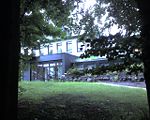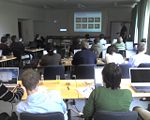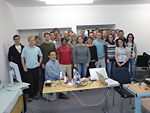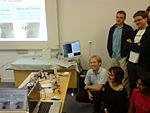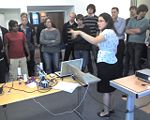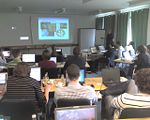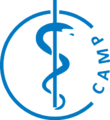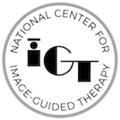Difference between revisions of "2008 June Workshop Germany"
m (Text replacement - "http://www.slicer.org/slicerWiki/index.php/" to "https://www.slicer.org/wiki/") |
|||
| (64 intermediate revisions by 11 users not shown) | |||
| Line 1: | Line 1: | ||
__NOTOC__ | __NOTOC__ | ||
| + | |||
| + | ==Introduction== | ||
| + | This event is a hands-on workshop about the NA-MIC kit. The workshop is intended for participants from within Germany and it was sponsored by the DFG. The target audience for this workshop are scientists with an engineering background who are considering using the NA-MIC kit as their software platform for research. The NA-MIC kit consists of free open source software without restrictions on use and without a give-back requirement. The NA-MIC kit is well-suited for both academic and commercial activities. | ||
| + | |||
| + | The participants will receive an overview of the software libraries, the end-user applications, and documentation that comprise the NA-MIC kit. The curriculum is '''hands-on''' which means that participants are required to attend the workshop with a suitable laptop, preloaded with the software and sample data as specified below. Attendance is limited in order to ensure quality interactions between the faculty and participants. | ||
| + | |||
| + | = Pictures from the Event = | ||
| + | <gallery perrow="4" widths="150px"> | ||
| + | Image:Munich2008-Venue.jpg | The IHK Akademie | ||
| + | Image:Munich2008-workshop.jpg| At work | ||
| + | Image:NAMIC-MUNICH2008.JPG|The group | ||
| + | Image:NAMIC-MUNICH2008_2.JPG|Having fun with the robot | ||
| + | Image:Munich2008-Danielle.jpg | Danielle teaching | ||
| + | Image:Munich2008-Seb.jpg | Sebastien teaching | ||
| + | </gallery> | ||
| + | |||
| + | Coincidentally we were there during the [[Media:Munich2008-WatchingEuro2008.mov | Euro2008 tournament.]] | ||
==Sponsors== | ==Sponsors== | ||
| − | <gallery perrow=" | + | <gallery perrow="4" widths="150px"> |
Image:NAMIC 380x463.jpg|[http://www.na-mic.org National Alliance for Medical Image Computing] | Image:NAMIC 380x463.jpg|[http://www.na-mic.org National Alliance for Medical Image Computing] | ||
| + | Image:CAMP_logo_blue.png|[http://wwwnavab.in.tum.de/WebHome Computer Aided Medical Procedures, TU Munich] | ||
Image:DFG zweizeilig sw.jpg|[http://www.dfg.de/ DFG] | Image:DFG zweizeilig sw.jpg|[http://www.dfg.de/ DFG] | ||
| − | Image:Nac.png|[http://nac.spl.harvard.edu/ | + | Image:Nac.png|[http://nac.spl.harvard.edu/ Neuroimage Analysis Center] |
Image:NCIGTlogo.gif|[http://www.ncigt.org National Center for Image Guided therapy] | Image:NCIGTlogo.gif|[http://www.ncigt.org National Center for Image Guided therapy] | ||
Image:LogoBIRN.jpg|[http://www.nbirn.net/ BIRN] | Image:LogoBIRN.jpg|[http://www.nbirn.net/ BIRN] | ||
| − | + | Image:Logo_CIMIT.png|[http://www.cimit.org CIMIT] | |
| + | Image:Isip.jpg|[http://www.intelli-si.org/index_e.html Intelligent Surgical Instrument Project, Japan] | ||
| − | + | </gallery> | |
| − | |||
| − | |||
| − | |||
| − | |||
| − | |||
| − | |||
| − | |||
| − | |||
| − | |||
| − | + | *June 15-17, [http://www.ihk-muenchen.de/trz/trz/inhalte/Westerham/index.html IHK Akademie Westerham] | |
=Program= | =Program= | ||
| − | + | Arrival: Sunday, June 15 | |
{| border="1" cellpadding="5" | {| border="1" cellpadding="5" | ||
|- style="background:#ebeced; color:black" align="left" | |- style="background:#ebeced; color:black" align="left" | ||
| Line 34: | Line 44: | ||
|- | |- | ||
| style="background:#ffffdd; color:black"| 08.00-08.30 | | style="background:#ffffdd; color:black"| 08.00-08.30 | ||
| − | | style="background:# | + | | style="background:#ccdd97; color:#522200"| Breakfast |
| − | | style="background:# | + | | style="background:#ccdd97; color:#522200"| Breakfast |
|- | |- | ||
| style="background:#ffffdd; color:black"| 08.30-10.00 | | style="background:#ffffdd; color:black"| 08.30-10.00 | ||
| style="background:#b4d597; color:#522200"| | | style="background:#b4d597; color:#522200"| | ||
*08.30-08.45 Welcome (Navab, Kikinis) | *08.30-08.45 Welcome (Navab, Kikinis) | ||
| + | ** Overview over [[media:NA-MIC_2008.ppt|NA-MIC]] | ||
*08.45-10.00 Engineering methodology: (Jomier, Barre) | *08.45-10.00 Engineering methodology: (Jomier, Barre) | ||
** Extreme programming | ** Extreme programming | ||
** What is a software engineering methodology, do I need one? | ** What is a software engineering methodology, do I need one? | ||
** The components of the NA-MIC kit software engineering tools: CMAKE, CTEST, CPACK, Dashboards | ** The components of the NA-MIC kit software engineering tools: CMAKE, CTEST, CPACK, Dashboards | ||
| + | ** [[media:Engineering_Methodology_-_2008_June_Workshop_Germany.ppt|(Barre's Slides)]] | ||
| + | ** [[media:Na-MIC-Germany-CTestCDash.ppt|(Jomier's Slides)]] | ||
| style="background:#b4d597; color:#522200"| | | style="background:#b4d597; color:#522200"| | ||
* 08.30-10.00 Slicer3 IGT | * 08.30-10.00 Slicer3 IGT | ||
| − | ** Slicer 3 IGT capabilities (Hata, | + | ** [[media:SlicerIGTOverview.ppt|Slicer 3 IGT capabilities]] (15 min. Hata) |
| − | ** IGT Workflows (Pace) | + | *** [[IGT:ToolKit|The IGT Toolkit]] |
| + | *** Concept, Architecture, Design | ||
| + | *** Application specific modules: Neuro, MRIg Prostate, Cardiac 3D US | ||
| + | ** [http://wiki.na-mic.org/Wiki/index.php/IGT:ToolKit/Neurosurgical-Planning IGT Workflows] using Neurosurgical Planning as an Example (60 min, hands-on tutorial, by Pace) | ||
| + | |||
|- | |- | ||
| style="background:#ffffdd; color:black"| 10.00-10.30 | | style="background:#ffffdd; color:black"| 10.00-10.30 | ||
| − | | style="background:# | + | | style="background:#ccdd97; color:#522200"| Coffee Break |
| − | | style="background:# | + | | style="background:#ccdd97; color:#522200"| Coffee Break |
|- | |- | ||
| style="background:#ffffdd; color:black"| 10.30-12.30 | | style="background:#ffffdd; color:black"| 10.30-12.30 | ||
| style="background:#b4d597; color:#522200"| | | style="background:#b4d597; color:#522200"| | ||
* How to use ITK, VTK, XNAT and Batchmake | * How to use ITK, VTK, XNAT and Batchmake | ||
| − | ** [http://www.itk.org/ItkSoftwareGuide.pdf ITK] (Jomier) | + | ** [http://www.itk.org/ItkSoftwareGuide.pdf ITK] (Jomier) [[media:Na-MIC-Germany-ITK.ppt|(Slides)]] |
| − | ** [http:// | + | ** [http://vtk.org VTK] (Barre) [[media:VTK_-_2008_June_Workshop_Germany.ppt|(Slides)]] |
| − | ** [http://www.xnat.org XNAT] (Pieper) | + | ** [http://kwwidgets.org KWWidgets] (Barre) [[media:KWWidgets_-_2008_June_Workshop_Germany.ppt|(Slides)]] |
| − | ** [[Media:NA-MIC-AHM08-BatchMake.ppt|Batchmake]] (Jomier) | + | ** [http://www.xnat.org XNAT] (Pieper) [[media:Pieper-XNAT-2008-06-16.ppt|(Slides)]] |
| + | ** [[Media:NA-MIC-AHM08-BatchMake.ppt|Batchmake]] (Jomier) [[media:Na-MIC-Germany-BatchMake.ppt|(Slides)]] | ||
| style="background:#b4d597; color:#522200"| | | style="background:#b4d597; color:#522200"| | ||
* Slicer 3 IGT continued | * Slicer 3 IGT continued | ||
| − | ** I/O to trackers, devices, and scanners: | + | ** [http://wiki.na-mic.org/Wiki/index.php/IGT:ToolKit/Navigation-tutorial I/O to trackers, devices, and scanners: OpenIGTLink] ( 45 min, Hands-on, by Pace) |
| − | ** [[LEGO_IGT_and_Medical_Robotics_Tutorial|Lego robot tutorial]] as an example of robot control (Pace) | + | ** [[LEGO_IGT_and_Medical_Robotics_Tutorial|Lego robot tutorial]] as an example of robot control (45 min, Demonstration, by Pace) |
| − | ** CUDA based volume rendering (Hata) | + | ***Participants do not need to download this tutorial software |
| − | ** | + | ** [https://www.slicer.org/wiki/Slicer3:Volume_Rendering_With_Cuda CUDA-based volume rendering] (15 Min, Demonstration, by Hata, [[media:slicerIGTCUDA.ppt|Slides]]) |
| + | ***Clinical needs, approach | ||
|- | |- | ||
| style="background:#ffffdd; color:black"| 12.30-13.30 | | style="background:#ffffdd; color:black"| 12.30-13.30 | ||
| − | | style="background:# | + | | style="background:#ccdd97; color:#522200"| Lunch |
| − | | style="background:# | + | | style="background:#ccdd97; color:#522200"| Lunch |
|- | |- | ||
| style="background:#ffffdd; color:black"| 13.30-15.00 | | style="background:#ffffdd; color:black"| 13.30-15.00 | ||
| style="background:#b4d597; color:#522200"| | | style="background:#b4d597; color:#522200"| | ||
| − | *Slicer3 | + | *Slicer3 (Pieper) |
| − | ** [[media: | + | ** Overview and Features [[media:Slicer-Overview-Features-Munich-2008-06-16.ppt|(Slides)]] |
| − | ** [[media: | + | ** Architecture and Implementation [[media:Slicer-Architecture-Implementation-Munich-2008-06-16.ppt|(Slides)]] |
| style="background:#b4d597; color:#522200"| | | style="background:#b4d597; color:#522200"| | ||
| − | *Plug-ins for Slicer 3 (Pujol) | + | *Plug-ins for Slicer 3 (Pujol): |
| − | ** Introduction: Plug-ins as a way to interface external programs (Pujol) | + | ** [[Media:ProgrammingIntoSlicer3_SoniaPujol_Munich2008.ppt |Introduction: ]]Plug-ins as a way to interface external programs (Pujol) |
| − | ** Programming into Slicer3 | + | ** [[Media:ProgrammingIntoSlicer3_SoniaPujol_Munich2008.ppt |Programming into Slicer3: ]] How-to make a "hello world" plug-in - Part 1 (Pujol) |
|- | |- | ||
| style="background:#ffffdd; color:black"| 15.00-15.30 | | style="background:#ffffdd; color:black"| 15.00-15.30 | ||
| − | | style="background:# | + | | style="background:#ccdd97; color:#522200"| Coffee Break |
| − | | style="background:# | + | | style="background:#ccdd97; color:#522200"| Coffee Break |
|- | |- | ||
| style="background:#ffffdd; color:black"| 15.30-18.00 | | style="background:#ffffdd; color:black"| 15.30-18.00 | ||
| style="background:#b4d597; color:#522200"| | | style="background:#b4d597; color:#522200"| | ||
| − | * [[Media: | + | * [[Media:3DVisualization_SoniaPujol_Munich2008.ppt|3D Visualization]](Pujol) |
| − | * [[ | + | * [[Media:AutomaticSegmentation_SoniaPujol_Munich2008.ppt | EM Segmentation ]] (Pujol) |
| style="background:#b4d597; color:#522200"| | | style="background:#b4d597; color:#522200"| | ||
| − | * | + | * Plug-ins continued (Pujol) |
| − | ** Programming into Slicer3 | + | **[[Media:ProgrammingIntoSlicer3_SoniaPujol_Munich2008.ppt |Programming into Slicer3: ]] How-to make a "hello world" plug-in - Part 2 (Pujol) |
| − | * 17.30-18.00 Registration in Slicer 3 | + | * 17.30-18.00 Registration in Slicer 3 [[media:Na-MIC-Germany-Registration.ppt|(Slides)]] (Jomier) |
|- | |- | ||
| style="background:#ffffdd; color:black"| 18.00-19.00 | | style="background:#ffffdd; color:black"| 18.00-19.00 | ||
| style="background:#b4d597; color:#522200"| | | style="background:#b4d597; color:#522200"| | ||
| − | + | * [http://www.mitk.org MITK] [[media:2008_NA-MIC_MITK.pdf|(slides)]] (Wolf, Neuhaus, Nolden, Maleike, Zelzer, all at [http://www.dkfz-heidelberg.de/en/mbi/index.html DKFZ]). MITK is an application framework that leverages the [[NA-MIC-Kit|NA-MIC kit]]. | |
| − | |||
| style="background:#b4d597; color:#522200"| | | style="background:#b4d597; color:#522200"| | ||
* 18.00-18.15 Closing remarks (Navab, Kikinis) | * 18.00-18.15 Closing remarks (Navab, Kikinis) | ||
| − | |||
|- | |- | ||
| style="background:#ffffdd; color:black"| 19.00-open | | style="background:#ffffdd; color:black"| 19.00-open | ||
| − | | style="background:# | + | | style="background:#ccdd97; color:#522200"| Dinner |
| − | | style="background:# | + | | style="background:#ccdd97; color:#522200"| Dinner |
|} | |} | ||
| + | = Prerequisites: Hardware and Software= | ||
| + | *'''Participants are required to install the NA-MIC kit components on their laptop in preparation for the workshop.''' Please follow the [http://www.na-mic.org/Wiki/index.php/Training:Workshop_Prerequisite '''Workshop Prerequisite instructions'''] to build Slicer3 and download the datasets. | ||
| − | + | Note: Building Slicer3 can take up to 2 hours. | |
| − | + | We recommend a minimum of 2 GB of RAM and a dedicated graphic accelerator with 128 MB of on board graphic memory. Windows XP, Linux (x86 and x86_64) and Darwin (ppc and x86) are supported. | |
| − | |||
| − | |||
| − | |||
| − | |||
| − | |||
| − | |||
| − | |||
| − | |||
| − | |||
| − | |||
| − | |||
| − | |||
| − | |||
| − | |||
| − | |||
| − | |||
| − | |||
| − | |||
| − | |||
| − | |||
| − | |||
| − | |||
| − | |||
| − | |||
| − | |||
| − | |||
| − | |||
| − | |||
| − | |||
| − | |||
| − | |||
| − | |||
| − | |||
| − | |||
| − | |||
| − | |||
| − | |||
| − | |||
| − | |||
| − | |||
| − | |||
| − | |||
| − | |||
| − | |||
| − | |||
| − | |||
| − | |||
| − | |||
| − | |||
| − | |||
| − | + | * Image Guided Therapy tutorial software and datasets: | |
| − | * | + | ** [http://wiki.na-mic.org/Wiki/index.php/IGT:ToolKit/Neurosurgical-Planning IGT Workflows using Neurosurgical Planning]: Download the tutorial slides and the tutorial dataset |
| + | ** [http://wiki.na-mic.org/Wiki/index.php/IGT:ToolKit/Navigation-tutorial I/O to trackers, devices, and scanners: OpenIGTLink]: Install the OpenIGTLink module and the tracker simulator; download the tutorial slides, the abdominal atlas and the tool model | ||
| − | |||
| − | |||
| − | |||
| − | |||
| − | |||
| − | |||
| − | + | =Faculty= | |
# Ron Kikinis | # Ron Kikinis | ||
# Steve Pieper | # Steve Pieper | ||
| Line 182: | Line 146: | ||
*Local Host: Nassir Navab | *Local Host: Nassir Navab | ||
| + | |||
| + | =Venue and Logistics= | ||
| + | The workshop will take place at the [http://www.ihk-muenchen.de/trz/trz/inhalte/Westerham/index.html IHK Akademie Westerham] on June the 16th and 17th, 2008 which is [http://maps.google.de/maps?f=q&hl=de&geocode=&q=ihk+akademie+westerham&sll=47.911308,11.826535&sspn=0.006357,0.013475&ie=UTF8&ei=LVXiR7XCKJGC3AKO5aXsDQ&sig2=6FMUFysSnMQylBd70Em9dw&cd=1&cid=47908296,11830927,18245121051090319374&li=lmd&z=14&t=m located] south-east of Munich. Faculty and participants are expected to arrive at the venue on Sunday the 15th to allow the workshop to begin on time on Monday morning. | ||
| + | |||
| + | All participants will receive a letter of invitation from the DFG. In addition to the workshop program the letter will contain a form that needs to be filled out and sent back to the DFG in order to get '''reimbursed for travel and accommodation costs'''. | ||
==Information on Public Transport for Local Travel== | ==Information on Public Transport for Local Travel== | ||
| Line 187: | Line 156: | ||
In regard to the ticket you need for local travel: you have two options depending on the size of the traveling group. You can either go for a partner day ticket (18 €, all zones/''Gesamtnetz'') or a single day ticket (10 €, all zones/''Gesamtnetz''). | In regard to the ticket you need for local travel: you have two options depending on the size of the traveling group. You can either go for a partner day ticket (18 €, all zones/''Gesamtnetz'') or a single day ticket (10 €, all zones/''Gesamtnetz''). | ||
| − | '''Coming from the Munich Airport''' | + | '''Coming from the [http://en.wikipedia.org/wiki/Munich_International_Airport Munich Airport]''' |
When going to the subway station at the airport you can choose between any of the two subways, either '''S1''' (west route) or '''S8''' (east route) though the '''S8''' is probably beneficial in terms of journey time (approx. 35 minutes). | When going to the subway station at the airport you can choose between any of the two subways, either '''S1''' (west route) or '''S8''' (east route) though the '''S8''' is probably beneficial in terms of journey time (approx. 35 minutes). | ||
| Line 201: | Line 170: | ||
''The last meters'' | ''The last meters'' | ||
| − | At '''Kreuzstraße''' you need to change into a regional express (e.g. RB30239, RB30245, RB30247, direction '''Bad Aibling''') which you will leave at the | + | At '''Kreuzstraße''' you need to change into a regional express (e.g. RB30239, RB30245, RB30247, direction '''Bad Aibling''') which you will leave at the first stop in '''Westerham'''. This final train trip requires an extra ticket which costs around 2€. |
Latest revision as of 17:00, 10 July 2017
Home < 2008 June Workshop Germany
Introduction
This event is a hands-on workshop about the NA-MIC kit. The workshop is intended for participants from within Germany and it was sponsored by the DFG. The target audience for this workshop are scientists with an engineering background who are considering using the NA-MIC kit as their software platform for research. The NA-MIC kit consists of free open source software without restrictions on use and without a give-back requirement. The NA-MIC kit is well-suited for both academic and commercial activities.
The participants will receive an overview of the software libraries, the end-user applications, and documentation that comprise the NA-MIC kit. The curriculum is hands-on which means that participants are required to attend the workshop with a suitable laptop, preloaded with the software and sample data as specified below. Attendance is limited in order to ensure quality interactions between the faculty and participants.
Pictures from the Event
Coincidentally we were there during the Euro2008 tournament.
Sponsors
- June 15-17, IHK Akademie Westerham
Program
Arrival: Sunday, June 15
| Time | Monday, June 16 | Tuesday, June 17 |
| 08.00-08.30 | Breakfast | Breakfast |
| 08.30-10.00 |
|
|
| 10.00-10.30 | Coffee Break | Coffee Break |
| 10.30-12.30 |
| |
| 12.30-13.30 | Lunch | Lunch |
| 13.30-15.00 |
| |
| 15.00-15.30 | Coffee Break | Coffee Break |
| 15.30-18.00 |
|
|
| 18.00-19.00 |
|
|
| 19.00-open | Dinner | Dinner |
Prerequisites: Hardware and Software
- Participants are required to install the NA-MIC kit components on their laptop in preparation for the workshop. Please follow the Workshop Prerequisite instructions to build Slicer3 and download the datasets.
Note: Building Slicer3 can take up to 2 hours. We recommend a minimum of 2 GB of RAM and a dedicated graphic accelerator with 128 MB of on board graphic memory. Windows XP, Linux (x86 and x86_64) and Darwin (ppc and x86) are supported.
- Image Guided Therapy tutorial software and datasets:
- IGT Workflows using Neurosurgical Planning: Download the tutorial slides and the tutorial dataset
- I/O to trackers, devices, and scanners: OpenIGTLink: Install the OpenIGTLink module and the tracker simulator; download the tutorial slides, the abdominal atlas and the tool model
Faculty
- Ron Kikinis
- Steve Pieper
- Noby Hata
- Sonia Pujol
- Danielle Pace
- Sebastien Barre
- Julien Jomier
- Local Host: Nassir Navab
Venue and Logistics
The workshop will take place at the IHK Akademie Westerham on June the 16th and 17th, 2008 which is located south-east of Munich. Faculty and participants are expected to arrive at the venue on Sunday the 15th to allow the workshop to begin on time on Monday morning.
All participants will receive a letter of invitation from the DFG. In addition to the workshop program the letter will contain a form that needs to be filled out and sent back to the DFG in order to get reimbursed for travel and accommodation costs.
Information on Public Transport for Local Travel
In regard to the ticket you need for local travel: you have two options depending on the size of the traveling group. You can either go for a partner day ticket (18 €, all zones/Gesamtnetz) or a single day ticket (10 €, all zones/Gesamtnetz).
Coming from the Munich Airport
When going to the subway station at the airport you can choose between any of the two subways, either S1 (west route) or S8 (east route) though the S8 is probably beneficial in terms of journey time (approx. 35 minutes).
With both trains you should travel to the station Ostbahnhof.
At Ostbahnhof you need to change to the S6 (direction Giesing) and leave the train at the terminal stop Kreuzstraße.
Coming from the Central Station
At central station you can directly enter the S6 (direction Karlsplatz/Stachus or Marienplatz) and leave the train at the terminal stop Kreuzstraße. The traveling time is around 50 minutes.
The last meters
At Kreuzstraße you need to change into a regional express (e.g. RB30239, RB30245, RB30247, direction Bad Aibling) which you will leave at the first stop in Westerham. This final train trip requires an extra ticket which costs around 2€.
